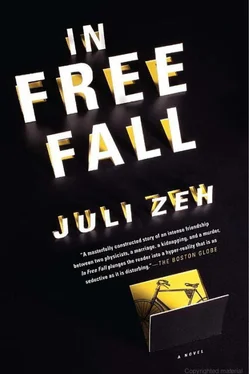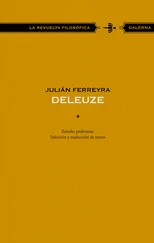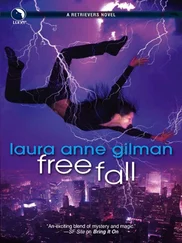He had a particular aversion to the two young men who stood blocking the entrance to the lecture theater every morning. Their arrogance was legendary and their friendship was the subject of gossip even among the lecturers. They were said to love physics even more than they loved each other, and they fought over it with the passion of rivals. Little Red Riding Hood could not bear listening to their bragging conversation. Their backs were far too straight as they stood there surrounded by a circle of listeners, reciting formulae like the verses of a libretto, ordering the universe with conductors’ hands. Every now and then Oskar would turn his head to draw on one of his Egyptian cigarettes, doing so with an affectation that stirred his audience into nervous movement.
The entire faculty had long since been made acquainted with Oskar’s view that the world was a finely spun web of causalities, with a hidden pattern that could only be deciphered either from a great distance or from up close. Recognition of the pattern, he intoned, was a matter of being at the right distance, and was therefore possible only for God and for quantum physicists. Normal people remained in the middle distance, blind to the nature of things.
Sebastian, who always spoke a little less loudly and also more slowly, called his friend a despicable determinist. He claimed not to believe in causality himself. Causality was, like space and time, a theoretical problem of cognition. To provoke Oskar and everyone around them, he cast doubt on the validity of empiricism as a method of establishing scientific findings. A man who stands by the river and watches a thousand white swans swim by cannot conclude that there are no black swans. Therefore physics is ultimately the servant of philosophy.
Little Red Riding Hood pushed past the arguing students impatiently. It was impossible to give a lecture any longer without hearing their intrusive voices. Sometimes he looked up grumpily from his notes, thinking that their whispering would drive him to the brink, only to realize that Oskar and Sebastian were not even present.
But they were very much present on the day that Little Red Riding Hood set a problem on dark energy, which could be solved only by the assumption of an Einsteinian constant that was not a constant. The next week, Oskar and Sebastian were not standing before the doors when Little Red Riding Hood arrived, but already sitting at their usual places, looking him in the eye. He summoned them to the board even before he had reached the lectern. They rose in unison. Oskar went to the right-hand side of the board; after a second’s hesitation, Sebastian went to the left. They flung their frock coats over their shoulders, and each held his with one hand as the other hand scratched frenziedly with a piece of chalk on the board. They wrote like men possessed: Oskar from the right and Sebastian from the left. The lecture theater was silent apart from the squeak of chalk that accompanied the growth of the equation. When their hands met in the middle of the bottom line, all fell still. A few faces in the auditorium cracked into smiles. Oskar completed the final lambda and clapped his hands together to shake off the chalk dust. Little Red Riding Hood was standing behind them looking at the panorama of equations with his mouth half open, like someone gaping at an impossibly beautiful view. Oskar turned around and tapped him on the shoulder with the tip of his finger, as if he were striking a triangle.
“Do you know what we have just proved, Professor?”
His voice was loud and resonant, but Little Red Riding Hood was too deep in thought to reply.
“Physics is for lovers.”
If Little Red Riding Hood made any retort, it was drowned out by the laughter and unrest that had broken out in the room. The sound of chalk breaking between Sebastian’s fingers was also obscured. While Oskar drank in the admiration for their work of art, Sebastian was still standing in front of the blackboard looking thoughtful. He finally pulled on his jacket and left the lecture theater, unnoticed by his friend. What had shaken him was the certainty with which Oskar had stepped to the right-hand side of the blackboard while pointing him toward the left.
The knowledge that Oskar had in no way meant to overshadow him did not make it any easier for Sebastian. The feeling of his own unfairness mingled with his foolish sense of humiliation. Oskar reveled in the spectacle and the exhilaration of pulling off a performance together, but Sebastian wanted to be a good physicist more than anything else in the world. For Oskar, being right was never any effort—it was the natural state of things. He had simply assumed that, unlike himself, Sebastian would be unable to write the mathematical derivation from back to front. The worst thing was—he was right. The moment their hands met in the middle of the blackboard was a onesided victory, and Sebastian felt the urge to punish Oskar for this. Only Oskar saw it as a celebration of their friendship and their brilliance. Sebastian saw it as proof of his own inferiority.
From that moment on, Sebastian froze in Oskar’s presence. He was not able to explain to his friend why the laws that governed their friendship had suddenly lost all validity. When they argued, his rejoinders grew sharper, and he found less and less time for shared research. Oskar did not fight against any of this. His calm gaze beneath half-closed eyes followed Sebastian into his sleep. His friend’s refusal to defend himself against this new aggressiveness made Sebastian even colder. In Oskar’s room, he shouted and raged against narrow walls and limited worldviews until one evening Oskar told him quietly and calmly that he was a man devoid of aesthetic sense. That night, Sebastian walked through the streets punching lampposts and declaring to them that something was not right with the world, that there must be other universes in which things went differently. In which it would be impossible for a man like him to throw away his own happiness despite knowing better. In which he and Oskar would never lose each other.
When they were defending their PhD theses, they no longer met on the bank of the Dreisam, but only for the occasional whiskey, sitting on lumpy stools at a bar. They were no longer of one mind on anything, except when it came to which one of them was the better physicist. It was Oskar; and after this conviction of theirs was confirmed by Oskar’s summa cum laude, Sebastian exchanged his morning jacket for jeans and a shirt, and got married.
The guests at the wedding whispered behind raised hands about the best man, who slid along the walls at the function room and whose presence seemed to be personally responsible for the shadows in the corners. From the expression on his face, it appeared that he had never been so amused about anything in his life. Instead of a veil, he told the painfully embarrassed guests, Sebastian should have put a green light on top of his bride’s head. All emergency exits had them.
“I’LL BET A CASE OF BRUNELLO,” Oskar says, “that they only asked for your article because of that time-machine murder.”
Sebastian is silent. That this is the case is clear as daylight. It is even in the description on the contents page: “Freiburg professor explains the theories of the time-machine murderer.” In his article, Sebastian has even tried to express certain things from the point of view of the murderer. After killing five people, the young man had explained that it was not murder at all, but a scientific experiment. He had traveled from the year 2015 to prove the Many-Worlds Interpretation. This theory considers time not as a continuous line, but as a vast heap of universes that expands minute by minute, like a kind of time-foam consisting of countless bubbles; so a journey into the past is not a return to an earlier point in human history, but a switch between worlds. Therefore it would be perfectly possible to reach into the past without changing the present. He could bear witness to the fact that all five of his victims were alive and well in 2015. In the world he belonged to, there were no murder victims and therefore no crime, and he did not feel subject to the jurisdiction of the year 2007, much as he regretted it. The advice of his lawyer, that he plead insanity, he had refused indignantly.
Читать дальше












